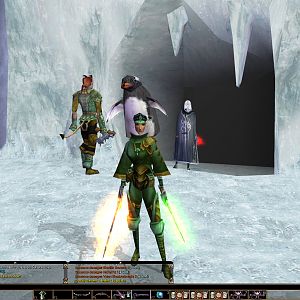-

- Forums
- Chatrooms
- Gallery
- Gameplay Videos
- Upload
- Articles
- Mod Reviews
- Shop SP: Games, Movies, Books


Video games, emerging as a dominant force in the entertainment realm, captivate global audiences with their immersive experiences. Technological advancements continue to blur the boundary between reality and fantasy within gaming; this ushers in an era where players navigate virtual landscapes that appear increasingly tangible. Such phenomenon provokes crucial inquiries into how these games impact individuals and society on an extensive scale. We help readers of Sorcerer's Place delve into this exploration, examining the technological, psychological and cultural aspects that contribute to a fascinating convergence; games blurring lines between reality and fantasy.
Technological Advancements
The evolution of gaming technology has been a driving force behind the blurring of reality and fantasy. With the rise of virtual reality (VR) and augmented reality (AR), players can now immerse themselves in environments that replicate or enhance their real-world surroundings. VR headsets transport users to alternate dimensions, allowing them to interact with a virtual world that appears and feels remarkably close to reality. This technological leap not only intensifies the gaming experience but also challenges the traditional boundaries that once separated the two realms.
Artificial intelligence is more than just the chat interface launched by Open AI. It is really remaking a number of fields, including gaming. Artificial intelligence will help make gaming more life-like, with characters that can have evolving personalities and respond dynamically to any prompt, rather than pre-set reaction or only limited prompts. When you combine this type of interaction with the increasingly impressive advances in virtual and augmented reality, suddenly the line between gaming and reality all but disappears.
Games Inspired by Real Life
Another way that games are bringing a new layer of inspiration to our reality is by basing games in reality. This sort of realism can be seen in games like Alpha Protocol, or even Grand Theft Auto, where the settings are well-known cities and streets, but the games then bring an extra layer. Having games based on real life can make them more visceral and immediate. They can also sometimes provide lessons for real life, like some video games that have brought light to the subtleties of mental illness. Either way, making games close to a mirror of reality is all the rage!
Another example is the burgeoning world of online casinos. You can find blackjack, poker, slots, and even live dealers at these online gaming sites. With so many options, it is recommended to read reviews like the ones found at Vegasslotsonline CA. These experts have reviewed over 1,200 online casinos and offer curated lists of best free slots and the best mobile slots based on your region. These reviews will help you sign up at a safe and trusted online gaming site.
Interactive Storytelling
Games are no longer just about achieving objectives or conquering challenges; they now offer complex narratives that rival those found in other forms of entertainment, such as movies and literature. The interactivity of storytelling in games enables players to shape the outcome of the narrative, blurring the lines between the scripted and the personal. This narrative interactivity heightens the emotional investment of players, further eroding the distinction between the game world and reality.
Games often serve as a form of escapism, providing players with an opportunity to step away from the challenges of reality and immerse themselves in fantastical worlds. In doing so, players can explore different facets of their identity, adopting roles and personas that may differ significantly from their everyday lives. The ability to create and customize avatars, coupled with expansive open-world settings, allows for a level of self-expression and identity exploration that blurs the boundaries between the virtual and the real.
Cultural Implications
The blurring of reality and fantasy in gaming has profound cultural implications. As gaming becomes more mainstream, the impact on social interactions, cultural norms, and even moral values becomes increasingly pronounced. Online multiplayer games, for example, facilitate social connections and collaborations among players who may be physically separated by vast distances. However, these interactions also introduce complex issues related to virtual identities, online behavior, and the consequences of actions within digital spaces. Many people have come to identify with their virtual avatars in important ways that are yet to be fully explored.
Conclusion
As technology continues to advance and gaming becomes an increasingly integral part of mainstream culture, the lines between reality and fantasy will likely continue to blur. The immersive capabilities of virtual reality, the power of high-fidelity graphics, and the interactive nature of storytelling all contribute to an experience that challenges our traditional understanding of what is real. Understanding the psychological and cultural implications of this phenomenon is crucial as we navigate the ever-evolving landscape of gaming. In doing so, we can foster a responsible and enriching gaming environment that embraces the convergence of reality and fantasy while acknowledging the potential challenges it presents.


